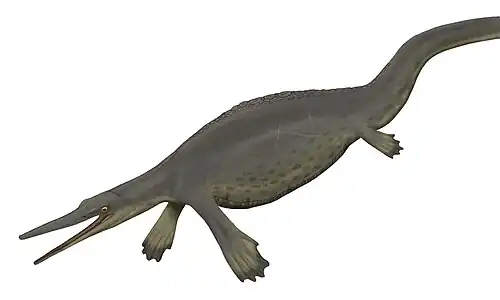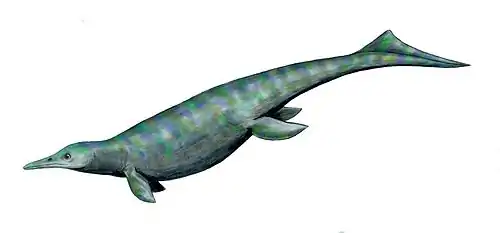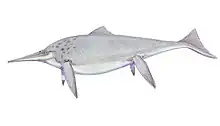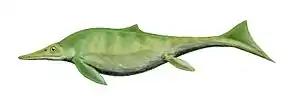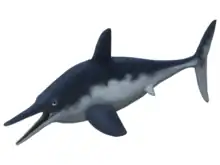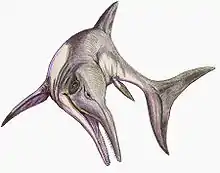| Delphinosaurus Temporal range: Early-Late Cretaceous, | |
|---|---|
| Scientific classification | |
| Kingdom: | |
| Phylum: | |
| Class: | |
| Subclass: | |
| Order: | |
| Suborder: | |
| Family: | |
| Genus: | †Delphinosaurus Eichwald, 1853 |
| Binomial name | |
| †Delphinosaurus kiprijanoffi Eichwald, 1853 | |
Delphinosaurus is a dubious genus of ophthalmosaurid ichthyosaur from Albian-Cenomanian deposits in the Kursk region of European Russia.
Merriam (1905) erected Delphinosaurus for the Late Triassic ichthyosaur Shastasaurus perrini from California, but because Delphinosaurus was already in use, the replacement name Californosaurus was erected.[1]
Classification
Eichwald (1853) erected Delphinosaurus for eight mandible fragments, twelve teeth, one rib, two centra, one humerus and one epipodial from the iron-rich sands of the Kursk area dating to the Albian–Cenomanian boundary. He classified the remains as those of amphibians, because of the presence of dolphin and reptile features, suggesting an intermediate form in between these groups, hence the name.[2] Later, however, he recognized Delphinosaurus as being an ichthyosaur in an 1865 monograph.[3]
In the supplementary material for their paper explaining the extinction of ichthyosaurs, Fischer et al. (2016) treated Delphinosaurus as a dubious genus of ophthalmosaurid, raising the possibility that the hypodigm for D. kiprijanoffi is composite due to some teeth resembling Sisteronia, and the humerus being morphologically distinct from Sisteronia.[4]
See also
References
- ↑ Hilton, R. P., (2003), Dinosaurs and other Mesozoic reptiles of California: University of California Press, 318pp.
- ↑ Eichwald, K. E. (1853). Einige paläontologische Bemerkungen über den Eisensand von Kursk. Bull. la Société Impériale des Nat. Moscou 2, 209–231.
- ↑ Eichwald, K. E. (1865). Lethaea Rossica ou Paléontologie de la Russie. Second Volume. Période Moyenne.).
- ↑ Fischer, V.; Bardet, N.; Benson, R.; Arkhangelsky, M.S.; Friedman, M. (2016). "Extinction of fish-shaped marine reptiles associated with reduced evolutionary rates and global environmental volatility". Nature Communications. 7: 10825. doi:10.1038/ncomms10825. PMC 4786747. PMID 26953824.
